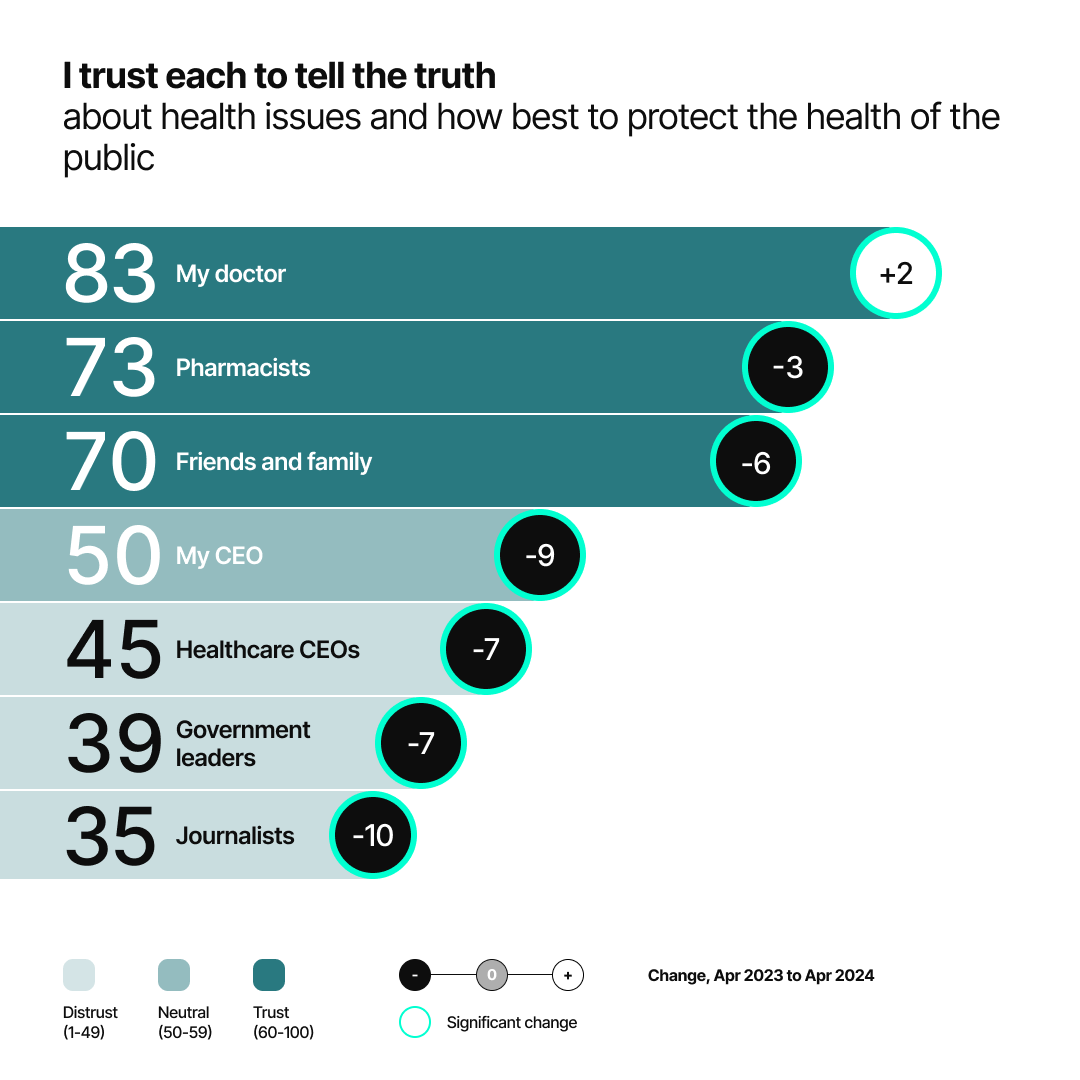The Empowered Patient
In the Ľ«ŔÖĘÓƵ Trust Barometer Special Report: Trust and Health, we explore the idea of health empowerment, and what it means for institutions responsible for the wellbeing of patients, employees, and consumers. As in the 2024 Ľ«ŔÖĘÓƵ Trust Barometer, the public has strong views about innovations in health, and factors from politicization to misinformation are imperilling trust and impacting health outcomes.
READ MORE
⇓
Forces that threaten health outcomes
My Provider is the most trusted to tell the truth about health issues
When asked how much they trust each group to tell the truth about health issues and how best to protect the public, respondents are more trusting of their primary care provider by a wide margin. Further, we see trust declines for all other sources. Remarkably, my CEO has fallen 9-points among employees in line with the decline for government leaders and journalists. The 10-point decline for journalists echoes the decline in trust on reporting of health media.

Explore the findings

Trust and empowerment optimize health outcomes
Depoliticize health
The influence of politics on healthcare and medical science is the fastest growing fear. Providers must be prepared to address these concerns when patients bring them into a clinical setting.
Fight the health information crisis
Information quality has exploded as a barrier to better health. Across institutions, serving as a source of reliable information on health is the top driver of increased trust.
Leverage provider influence
Healthcare providers are consistently the most trusted voices on health. Patients want more from them than just healthcare: They also want to vet health information and public health policies with their provider.
Put me in charge of my health
Pairing empowerment with trust makes people 19 points more likely to report good health than trust alone. To build empowerment, treat consumers like equal partners in managing their health.
Explore the findings
Top 10
01
Trust in institutions for health needs declines across the board
⟲
01
My employer is the only institution trusted (among employees) to address health needs. All institutions saw a significant drop in health trust from 2023 to 2024.
02
Concerns about health misinformation are top of mind
⟲
02
Respondents say the top three sources of misinformation that led them to a poor health decision are product advertisements, friends and family, and user-generated content.
03
Acceptance of AI in healthcare is at risk
⟲
03
Respondents are split on accepting vs rejecting AI in drug development and medical diagnosis. More reject than embrace AI in patient interaction.
Insights
The report was launched at a global event featuring Richard Ľ«ŔÖĘÓƵ, CEO, Ľ«ŔÖĘÓƵ & Kirsty Graham, U.S. CEO, Ľ«ŔÖĘÓƵ, and a panel discussion moderated by Courtney Gray Haupt, Global Chief Operating Officer, Health & Chair, U.S. Health; with Dr. Audrey Sue Cruz, MD, Internal Medicine Physician & Social Media Influencer; Caitlin Owens, Senior Health Care Reporter, Axios; Erin Sexton, Senior Director, External Relations, Mayo Clinic; and Gabriella Stern, Director of Communications, World Health Organization.
Subscribe for our research and insights directly to your inbox:
Methodology
The 2024 Ľ«ŔÖĘÓƵ Trust Barometer Special Report: Trust and Health is the firm’s 3rd annual survey. The research was produced by the Ľ«ŔÖĘÓƵ Trust Institute and consisted of 30-minute online interviews conducted between March 4 and March 13, 2024. Learn more >
16
Countries
15,000+
Respondents
±1,000
Respondents / Country









